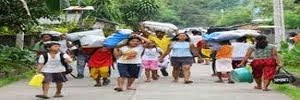From the Website of DSWD
links: http://www.dswd.gov.ph/2013/04/dswds-statement-on-the-2012-poverty-incidence-statistics/
DSWD Statement on the 2012 Poverty Incidence Statistics
Posted on 24 April 2013.
In reaction to the latest poverty incidence statistics
released by the National Statistical Coordination Board (NSCB)
indicating that poverty has eased a little vis-à-vis in 2006 and 2009,
DSWD Secretary Corazon Juliano-Soliman said that the DSWD takes this as a
challenge to improve its contribution to the national anti-poverty
program of the Aquino administration.
In the report by NSCB, poverty incidence was estimated at 27.9 percent during the first semester of 2012, comparing this with 28.8 percent poverty incidence in 2006 and 28.6 percent in 2009.
“We would like to assure that the DSWD is doing its best to implement programs and projects that will contribute to the poverty alleviation efforts of the government,” Secretary Soliman said.
Secretary Soliman cited the Philippine conditional cash transfer (CCT) program or the Pantawid Pamilyang Pilipino Program being implemented by the DSWD, wherein 3,841,992 poor households are now benefitting from the program, as of April 3, 2013. It is implemented in 1,627 cities and municipalities in 79 provinces in 17 regions nationwide.
Secretary Soliman, however clarified that the CCT is not the only solution to poverty explaining that it should be converged with other government programs like employment, livelihood, shelter, education, health, and agriculture. “CCT is just one of the government’s anti-poverty programs. The cash grant under the Pantawid Pamilya is like a life buoy (salbabida) to put stability to the situation of the poor, while investment on health and education is being done” Secretary Soliman said.
Secretary Soliman said that the CCT is a long-term program and is not expected to be able to improve poverty incidence situation this soon.
“It will benefit the next generation by breaking the intergenerational cycle of poverty. If children are educated and healthy then productivity may be achieved and productivity means income,” Secretary Soliman said.
Secretary Soliman cited some significant gains of the Pantawid Pamilya along improving education, health, and overall condition of the beneficiaries.
Based on the Philippines Conditional Cash Transfer Program, Impact Evaluation 2012 of The World Bank, Pantawid Pamilya is on track to achieve its objectives of promoting intervention in the health and education of children while providing immediate financial support to poor families. The report lists the following findings comparing enrolment and school attendance between beneficiaries and non-beneficiaries:
• In Pantawid barangays, 76 percent of preschoolers are enrolled in daycare, compared to 65 percent in non-Pantawid barangays;
• Among school children at age 6-11, 98 percent of children in Pantawid barangays are enrolled in school, as against 93 percent in non-Pantawid barangays; and
• Children in Pantawid barangays from age 6-14 also have higher school attendance (95-96 percent) as compared to children in non-Pantawid barangays (91 percent).
In health, the study found that:
• 64 percent of pregnant mothers in Pantawid barangays had antenatal care as against 54 percent in non-Pantawid barangays;
• 85 percent of children in Pantawid barangays age 6-14 have undergone deworming as against 80 percent in non-Pantawid barangays;
• 81 percent of children in Pantawid barangays at age 0-5 have taken Vitamin A supplements as against 75 percent in non-Pantawid barangays
Pantawid Pamilya is one of the three core poverty reduction programs of the DSWD. The other two are: the Sustainable Livelihood Program and the Kapit-Bisig Laban sa Kahirapan – Comprehensive and Integrated Delivery of Social Services (KALAHI-CIDSS), a community-driven development program. These programs were converged since 2011 to achieve greater impact.
Secretary Soliman stressed that the DSWD is now instituting steps to converge these three programs with other government projects to ensure a sustainable empowerment of the people. ###
DSWD Webaite
http://www.dswd.gov.ph/
links:
http://www.dswd.gov.ph/2013/04/dswds-statement-on-the-2012-poverty-incidence-statistics/
In the report by NSCB, poverty incidence was estimated at 27.9 percent during the first semester of 2012, comparing this with 28.8 percent poverty incidence in 2006 and 28.6 percent in 2009.
“We would like to assure that the DSWD is doing its best to implement programs and projects that will contribute to the poverty alleviation efforts of the government,” Secretary Soliman said.
Secretary Soliman cited the Philippine conditional cash transfer (CCT) program or the Pantawid Pamilyang Pilipino Program being implemented by the DSWD, wherein 3,841,992 poor households are now benefitting from the program, as of April 3, 2013. It is implemented in 1,627 cities and municipalities in 79 provinces in 17 regions nationwide.
Secretary Soliman, however clarified that the CCT is not the only solution to poverty explaining that it should be converged with other government programs like employment, livelihood, shelter, education, health, and agriculture. “CCT is just one of the government’s anti-poverty programs. The cash grant under the Pantawid Pamilya is like a life buoy (salbabida) to put stability to the situation of the poor, while investment on health and education is being done” Secretary Soliman said.
Secretary Soliman said that the CCT is a long-term program and is not expected to be able to improve poverty incidence situation this soon.
“It will benefit the next generation by breaking the intergenerational cycle of poverty. If children are educated and healthy then productivity may be achieved and productivity means income,” Secretary Soliman said.
Secretary Soliman cited some significant gains of the Pantawid Pamilya along improving education, health, and overall condition of the beneficiaries.
Based on the Philippines Conditional Cash Transfer Program, Impact Evaluation 2012 of The World Bank, Pantawid Pamilya is on track to achieve its objectives of promoting intervention in the health and education of children while providing immediate financial support to poor families. The report lists the following findings comparing enrolment and school attendance between beneficiaries and non-beneficiaries:
• In Pantawid barangays, 76 percent of preschoolers are enrolled in daycare, compared to 65 percent in non-Pantawid barangays;
• Among school children at age 6-11, 98 percent of children in Pantawid barangays are enrolled in school, as against 93 percent in non-Pantawid barangays; and
• Children in Pantawid barangays from age 6-14 also have higher school attendance (95-96 percent) as compared to children in non-Pantawid barangays (91 percent).
In health, the study found that:
• 64 percent of pregnant mothers in Pantawid barangays had antenatal care as against 54 percent in non-Pantawid barangays;
• 85 percent of children in Pantawid barangays age 6-14 have undergone deworming as against 80 percent in non-Pantawid barangays;
• 81 percent of children in Pantawid barangays at age 0-5 have taken Vitamin A supplements as against 75 percent in non-Pantawid barangays
Pantawid Pamilya is one of the three core poverty reduction programs of the DSWD. The other two are: the Sustainable Livelihood Program and the Kapit-Bisig Laban sa Kahirapan – Comprehensive and Integrated Delivery of Social Services (KALAHI-CIDSS), a community-driven development program. These programs were converged since 2011 to achieve greater impact.
Secretary Soliman stressed that the DSWD is now instituting steps to converge these three programs with other government projects to ensure a sustainable empowerment of the people. ###
DSWD Webaite
http://www.dswd.gov.ph/
links:
http://www.dswd.gov.ph/2013/04/dswds-statement-on-the-2012-poverty-incidence-statistics/
PROTECTION AND PROMOTION OF HUMAN RIGHTS
----------------------------------------------------------------------------------------------------------
--------------------------------------------------------------------------------
---------------------------------------------------
--------------------------------------------------------------------------------
---------------------------------------------------

























0 comments:
Post a Comment